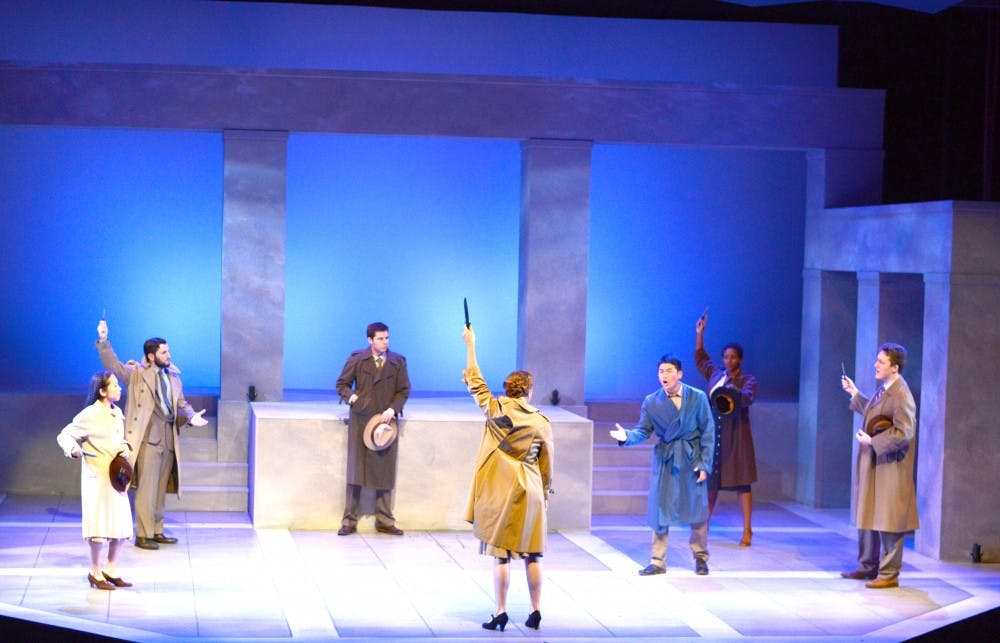VADA impresses with pithy production of Julius Caesar

It is clear that our country currently faces a charged political environment. Whatever views one holds about the upcoming election, it is easy to be swept up in the virulent language that each side vigorously deploys. The Rice visual and dramatic arts department strides confidently into this charged political climate with a production of “Julius Caesar” that highlights the similarities between our American system and the age-old drama of despotism, democracy and rhetoric. In “Julius Caesar,” the VADA department appears to have done the improbable: With a minimal set, simple costuming and in large part retaining the original language, the cast and crew manage to capture the spirit and passion of the Shakespearian tragedy while connecting it to modernity.
“Julius Caesar” tells the story of the conspiracy against its titular character’s life by Roman senators at the height of his reign and is thus a play whose success depends primarily on the oration of its actors. Fortunately for the VADA production, the leads handle this task in perfect form. The lead conspirators are Cassius, played by Hanszen College sophomore Nonie Hilliard, and Brutus, played by Martel College sophomore Alan Kim — Both are true standouts: Each speaks every line of dialogue with a degree of emotion and intention that is incredible for the dense, Shakespearian language that they are assigned. Hilliard is especially well-suited for her role, playing Cassius’s complex mix of political ambition and respect for Brutus with such sincerity that she seems to embody the entire conceit of the conspiracy. Though he plays a rather small role in the play, McMurtry College freshman Zach Verne is excellent as Julius Caesar; his portrayal highlights the latent rage and hubris that defines Caesar and provides an excellent foil for Brutus’s stoicism. Finally, Jones College junior Justin Bernard performs Mark Antony’s famous monologue with such fervor and excellent timing that one cannot help but be struck by the power of oratory to incite people to action. The monologue is a crucial, powerful moment in the tragedy, and Bernard handles it masterfully with the help of some strategically darkened lighting and frenetic ensemble staging suggestive of the mob rule he inspires.
When performing a Shakespeare play, there is tremendous pressure to adapt; at first glance, it seems impossible that a play from 1599 could be relevant to modern worries. Director Jack Young steers a wise course with the VADA department’s production in this area, retaining much of the original intent of the play while cutting scenes during the tense fourth and fifth acts. Young also utilizes a timeless, monolithic set and 20th-century costuming to suggest a modern applicability. Furthermore, the use of monochromatic lighting and practical sound effects lend direct emotional weight to otherwise dense Shakespearian language, so that the audience remains engrossed in the action onstage throughout the play. These assistive devices are the mark of a director who understands the innate power of his material; the VADA production retains one’s interest effectively without resorting to modern reinterpretation.
Furthermore, the costuming in “Julius Caesar” is ingenious: In the first half of the play, which focuses on the political aspects of conspiracy, every character is dressed in vaguely modern, professional clothing, suggesting a linkage to contemporary life. In the second half, however, the costumes are much more military and reminiscent of the French Resistance in World War II. This transition places a dire prophecy in the mind of the viewer, though the specifics of this particular implication may change depending on the audience member.
The VADA department’s production of “Julius Caesar” is, in a word, strong. In every aspect, it is clear the cast and crew put a surfeit of effort and heart into the play and, in combination with a deep understanding of the merits of Shakespearian literature, they have crafted an excellent rendition. By developing a minimal aesthetic, the play also benefits from inevitable connections to modern cultural touchstones such as “The Hunger Games” and the current political situation. Thus, the VADA production serves precisely the role the best modern Shakespeare productions do; it is a bridge between history and today,which calls attention to the essential human qualities that persist through time. I would encourage anyone with any political interest whatsoever to see this play as soon as possible.
More from The Rice Thresher

Night Market brings Taiwanese tradition to Ray’s Courtyard
Colorful strings of paper lanterns and glowing lights hung over Ray’s Courtyard amid bustling games April 13, as the Rice Taiwanese Association hosted their annual Night Market.

Meet the Magisters: Fabiola López-Durán and Carlos Martínez-Rivera on architecture, wine and student bonds
Behind an unassuming brick exterior lies abstract art, overflowing bookshelves and handcrafted wood furniture. Floor-to-ceiling windows bathe the home of Fabiola López-Durán and Carlos Martínez-Rivera in natural light.

Media to enjoy this Arab American Heritage month
This month is Arab American Heritage Month — so what better time to highlight media created by and about the Arab world? Here are some of the best works by Arab filmmakers, musicians and writers that showcase the diversity and complexity of Arab experiences.

Please note All comments are eligible for publication by The Rice Thresher.